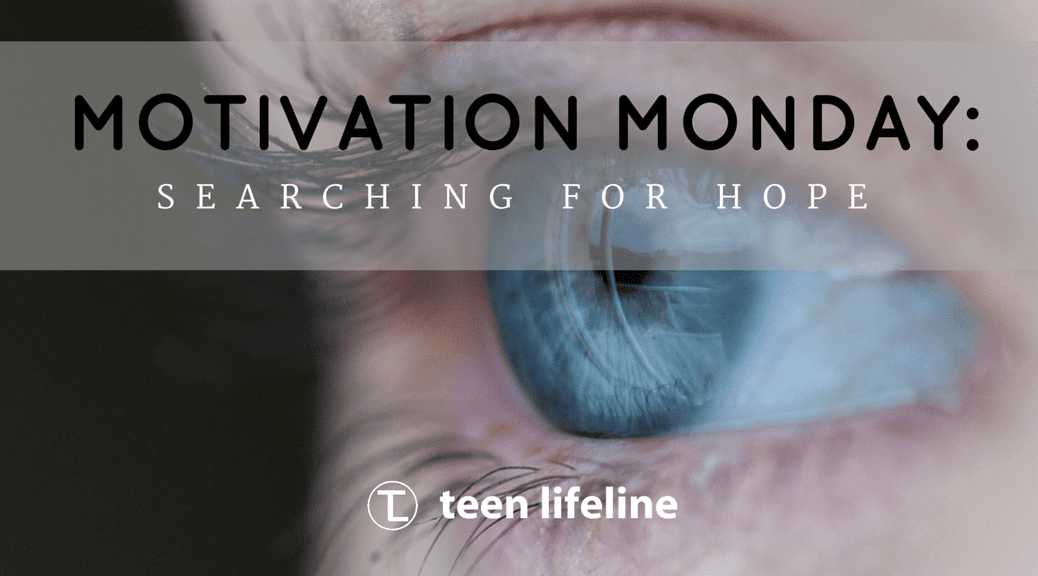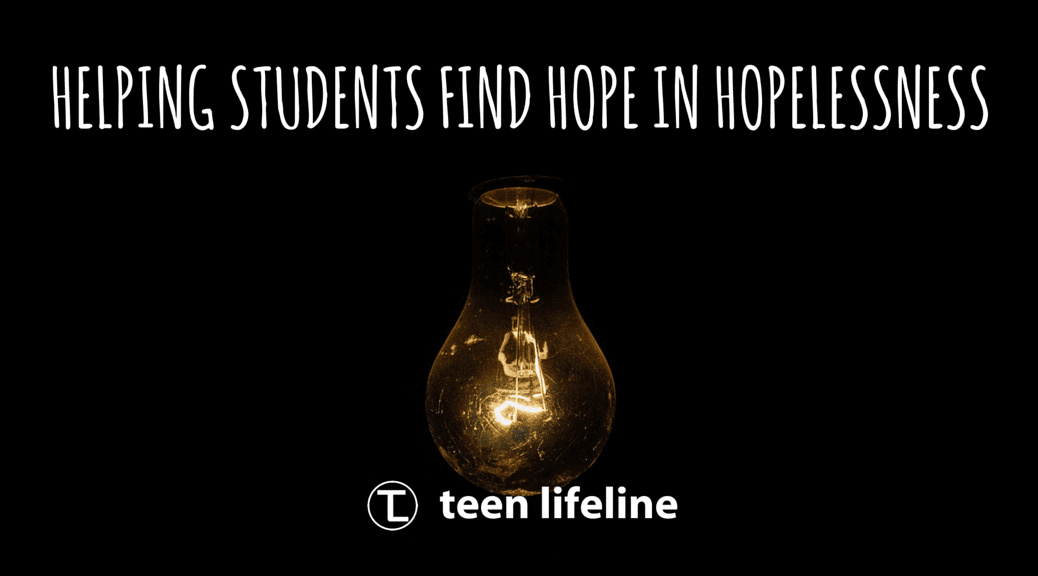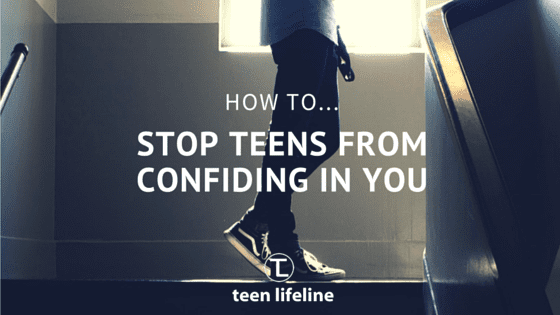
by Karlie Duke | Apr 14, 2016 | Parenting, Support Groups
The more I work with teenagers, the more evident is that they are their own worst enemy and biggest critic.
Check out this story from one of our facilitators, Josh Hardcastle, about a conversation that happened in his support group with teenage guys:
A couple of weeks ago, we were talking about the negative influences and negative voices in our lives. Some of the guys in the group spoke up and were talking about how when other people put them down, they believe it. They believe that they…
Are Lazy.
Are Stupid.
Won’t Succeed.
Are Slow.
Are Punks.
Can’t get anything right.
So then I threw out the question, “What if you didn’t believe them?”
I had remembered a line from a book I read that said something like, “The names that we embrace are the names that we become.” I shared with them some of the struggles with the names that I had been called in High School by a coach. After hearing it so many times, I began to believe that I was that name.
There was something about this whole conversation and group time that really clicked with them. I could actually see hope and strength starting to resonate with a few of them. They were sitting up straight and absolutely silent. Not because they didn’t know what to say, but because it looked like they were thinking about not believing they were these names that they had been called for so long.
Towards the end of the group time, one of the guys asked, “So does this work with me too? Because I put myself down more than anybody else.”
Man that broke my heart! But we were able to have a conversation as a group about what that looked like and how we can avoid embracing the negative names and voices we call ourselves. I closed out the group by asking, “What do you guys notice about everyone’s pages and what they heard from the important voices in their lives?” A few of them gave me the answers that most everybody had written down their family or best friends, but one of my quiet kids raised his hand and said, “Everyone has more than two important, positive voices who speak into their lives.”
I took it one step further and asked, “So what does that mean?” Another guy jumped in and said, “That we should be listening and focusing on the positive voices and ignoring the negative ones.”
Boom. Nailed it.
Teenagers are surrounded by all kinds of negative and critical voices, but these voices do not just come from outsiders. Sometimes, the worst thoughts are coming from inside their own heads.
So what can we do? How can we help encourage teenagers to think positively and be a better judge of their self-worth? I have a few suggestions for what we can do as parents, teachers, mentors and friends:
1. Ask questions that will allow them to brag.
Instead of bringing up that “B” on a test, or the fact that they were late getting home (…again), ask one of these questions: “What is one thing that you did really well today?” or “How did you help someone today?”
By asking these question, you are prompting their own brain to focus on the positive aspects of the day. You are telling them that they are capable of great things and you want to hear about the things that they are going well.
Let’s help train teens to engage in beneficial bragging! Bragging that fosters a good sense of self-worth and positive self-esteem.
2. Point out the little things.
Did your teen wash the dishes without being asked? Say, “THANK YOU!”
Resist the urge to say something like, “What’s wrong with you?! You never do the dishes without asking!” or “Finally! Now you’re doing the dishes every night for the rest of your life!”
I know this might be a silly example, but by encouraging the little things they do without adding a backhanded dig or sarcastic comment, they will also pay attention to the important role they can play!
Tell them when you are proud. Hang up that last report card on the fridge. Brag about the way they love on their siblings. Teenagers are necessary, helpful, hardworking and FUN – don’t forget that!
3. Encourage realistic goal-setting.
When I am hard on myself or engage in negative self-talk, it tends to be when I am disappointed in myself or feel like I haven’t reached the goal I set for myself. After a busy week, I am upset that the house is a little messy and that I didn’t cook every meal at home. I beat myself up when I miss one tiny detail on a big project, or find a typo in a blog post.
Goals are a great thing to have, but we should be realistic and not sweat over the little things! Encourage teenagers to set small goals. When they reach that goal, help them celebrate and especially if they don’t matter – forget about the tiny things that might not be perfect.
Perfection isn’t a realistic goal. But here are a few realistic goal examples for teenagers:
- Be on time to school in the morning – who cares if you forgot to brush your hair or ate a pop tart instead of a well-rounded, healthy breakfast?!
- Help with one thing around the house – start small by making the bed, or doing the dishes after dinner!
- Improve on the next test – don’t get upset if the next grade isn’t a perfect 100, but strive to do better than that last test!
Once you help them come up with, write down and spend time on their goals, don’t forget to celebrate when a goal is reached!
What do you think of these ideas? How else can we encourage teenagers to engage in positive self-talk?
Karlie Duke was in one of Teen Lifeline’s original support groups and now is our Communications Director. She is passionate about encouraging students to live better stories.

by Karlie Duke | Mar 14, 2016 | Support Groups
We are only 3 weeks away from the 7th annual #TL5K!
If you would like to donate or help by becoming a fundraiser, visit our #TL5K site!
In our Teen Lifeline Support Groups, we believe that in order for a student to excel in school, at home and at life in general, we must take care of the whole person. We must nurture their emotional health, discuss their physical health and even offer an opportunity to discuss their spiritual well-being. Even in the public school system, everyone we work with agrees that having a place for spiritual discussions is necessary – it is too important to ignore!
When we have these conversations, we center it around the relationships in their lives, including a relationship with God or a higher power. The great thing is, teenagers feel that they can be honest without receiving judgement from the facilitator or the rest of the group! In some of my high school groups, I have had teenagers share that their “higher power” is music, or love, or Jesus, or Buddha. Not everyone in the group has to be on the same page or at the same stage spiritually, but as you will see from Jason Brown’s story, these discussions open a door for healing and hope.
One of my favorite group sessions to facilitate is week number four: The Whole Person. This is a great opportunity to talk about faith because we discuss relationships with people in our lives; the discussion inevitably leads to a discussion about God (or a higher power). It’s about being spiritually connected. I have found that most of the group members during this session share about a relationship with God. Some feel like He is at the center of their life, others like they are not very close. Every so often, someone describes themselves as atheist and not believing in God.
On one occasion during a group session, we were discussing The Whole Person topic and a young man in our group said he didn’t believe in God. As I typically do, I acknowledged his opinion and we continued with the discussion. The discussion progressed and the group had the opportunity to write questions about spirituality on cards and then spend time discussing and answering each other’s questions. Several of the young men asked questions about Jesus and how to know if He existed. Someone asked about God and how He could be so forgiving. There were several other questions about faith. During this discussion, it was evident that the young man who claimed to be atheist was a little uncomfortable with the discussion. He began to ask his peers a few questions and even spoke about demons. It was as if a door suddenly opened; if he believed in demons, then he could no longer deny that there wasn’t another side to the story. His peers actually called him out on this. I was able to have a great follow up discussion as the group came to a close. This young man was wrestling with faith, and he was trying to decide if God was real or if he had no hope. Through our Teen Lifeline group, a seed was planted that day and hope was shared.
Jason Brown is the Community Minister at Legacy Church of Christ. He has been leading groups with Teen Lifeline for 3 years in Birdville ISD and at TYRC.

by Karlie Duke | Feb 15, 2016 | Events, Resources, Support Groups
We are only 7 weeks away from our 7th annual TL5K!
As we continue to share stories from our Teen Lifeline Support Groups, we hope that you are seeing the benefits that these groups bring to the students, school districts, campus counselors and the facilitators that lead these groups.
We are so passionate about our #TL5K is because the funds raised by this one event help make these groups possible! We have the opportunity to continue to grow and reach teenagers with 100 volunteer facilitators trained to use our Life Lived Better Curriculum to lead support groups in their local school or church.
One of my favorite things about working for Teen Lifeline is sharing group stories with these other facilitators, and this has been especially fun since my mother-in-law, Julee Duke, started leading groups this semester! I may be a little biased, but she is providing support and encouragement to students who need a listening ear and a chance to be heard and accepted. Her job, and the goal of all of our facilitators, is to equip, encourage and empower the students in their groups to live life better – to choose to live a better and different story.
My name is Julee Duke, and I am leading my first Teen Lifeline group at a Middle School in Fort Worth ISD. I have nine 8th grade girls in my group, and although we are only halfway through the 8-week Support Group Curriculum, I have learned so much about these girls and their need for hope in their lives.
The first week proved to be challenging with one girl not making eye contact with me or speaking a word, but slowly scooting her chair closer and closer until she was right beside me by the end of our time together. Since that first day, she is the first one in the room and the last one out, in hopes of having a one-on-one moment with me outside of the group. She is now looking at me, smiling and sharing difficult memories and joyous victories – HOPE!
With this particular girl and the rest of the group, as the weeks have passed, hearts have softened. The girls are now fully engaged and look forward to our time together. It isn’t me or the snacks that I provide at the end that makes them want to come back – it’s that their deep desire to be heard and acknowledged is being met, some for the first time in their young lives.
There have been tears shed, confessions made, and difficult stories shared. I am extremely thankful for this opportunity and am blessed to be a small part of encouraging young people that there is hope for a better life.
In case you missed our last blog on hope, check out Chris Robey’s ideas on Helping Students Find Hope in Hopelessness.
Julee Duke is a mom of 4 great kids, volunteers with the youth at Fielder Church, and has been leading a Teen Lifeline group in Fort Worth ISD since January 2016.

by Chris Robey | Feb 4, 2016 | Parenting, Resources, Support Groups
A few weeks back, I was sitting with some students from a really tough part of our city and working through some of their resources. Part of our groups involve identifying and building up the student’s sense of courage, connectedness, self worth, and capability. What we noticed with this group is a general lack of self-reported capability. This seemed to be the trend throughout the group of young men.
This was a strange happening in my experience. Generally, a group of young men will tend to overstate their courage and capability from a place of machismo or even lack of self-esteem. It’s a coping mechanism everyone uses from time to time to protect us from being real with each other.
Yet for some reason, these young men decided to stop with the charade. Several of these young men were facing criminal charges as adolescents and were in a general “holding pattern” as they awaited what their PO (parole officer) or presiding judge had to say about their case. They felt like they had no real recourse and that the mistakes they made would follow them for the rest of their lives.
These young men were between the ages of 15 and 17, and at this early age, they were experiencing something reserved for people typically much older – hopelessness.
This hopelessness echoes from their upbringing, family structure, and their neighborhood. It’s a general sense that no matter what happens, they are doomed to the same cycle they have seen over and over again. My guess is this hopelessness has been ingrained earlier than my arrival into their lives.
So today, I am wondering as a “helper” of students, what can I do to bring hope to those whose hope has escaped at an age where hope should abound? I have a few things I have been thinking through along these lines, but I’d like to hear more feedback from you!
- Help students see their “preferred future” – This is technique based in solution focused therapy, but it is a really great tool to help the hopeless imagine what their life would be like if things were different. I typically ask students the simple question, “What do you want?” I usually don’t have to be a lot more specific than that. And with that question comes glimmers of hope. You see, even in the darkest night of the soul, the soul still knows what it wants.
- Help them work backwards from their “preferred future” – When they establish the goal, help them identify simple, realistic, and controllable steps to start walking in that direction. I wouldn’t even focus on what it would take to accomplish the desire. Really, this is likely too much to handle in the moment. Instead, what would it take to at least turn in the right direction and even take a small step? Maybe it is simply getting more sleep, finding a new job, or asking for help. Try to stay with the small and manageable tasks.
- Help them to think about how things will be different when they get to their “preferred future” – In other words, will this make much of a difference? Often the solutions we want won’t really fix anything, but sometimes they do. Helping students think about what things need to be different for their futures to look more positive are very simple. Sometimes life isn’t as horrible as we think it is in our worst moments.
One of the most unacceptable circumstances for me to witness is a hopeless student. I’m not okay with it. None of us should be.
So with the three simple ideas I posed here, what would you add to help students find hope in hopeless situations? We would love to hear back from you!
Chris Robey, Program Director, has worked with teens for over a decade and strives to help students see the best in themselves.

by Karlie Duke | Jan 28, 2016 | Parenting, Resources, Support Groups
One of my favorite parts of my job is getting to encourage teenagers to have meaningful relationships with adults. We talk about who they are close to and who they can go to for help. I love encouraging them to find adults that they can confide in and who will speak truth into their lives.
Unfortunately, when we talk about parents, teachers, and other adults, students often say something along the lines of, “I can never tell them anything because…(fill in the blank).”
Some of this can be attributed to those teenage years when many students want to separate themselves from adults as much as possible. However, there are also many adults who are acting (probably unintentionally) in a way that insures teenagers will never talk to them about anything serious/important.
Here are a few ways that you can make sure teenagers never confide in you:
Tell them that they are just being dramatic.
Teens have a flair for the dramatic – we know this. However, when they are sharing something important and personal, that is not the time to point out those dramatic tendencies.
If they are sharing feelings of depression or thoughts of suicide, always take that seriously. First, make them feel validated in their feelings, and then you can ask more questions to determine what the next step should be. I’m sure you would rather be on the safe side of believing them and getting help, rather than blowing it off and having to get help after something bad has already happened.
Be dramatic when they tell you something.
While you can’t tell them that they are being dramatic, you also cannot be dramatic in return. I have had many teens (especially guys) tell me that they don’t share things with their parents because they freak out, cry, ground them or “make them go to church and confess.” (A real student told me that).
I know it can be upsetting if your child tells you that they are pregnant or failing or on drugs or depressed, but you must remain shock proof in front of them! Later when you are alone, you can break down, but how are they supposed to trust you to help them if you can’t even handle what they are telling you?
Betray their confidence.
Hear me out on this – there is a difference between asking a professional, a minister or a good friend for help and gossiping to your friends about what a teen is going through.
If it is a matter of safety (they are hurting themselves or someone else, or someone is hurting them), then you need to report that conversation or get help. However, I once had a student tell me that after they spoke to a teacher in confidence, he overheard that teacher laughing about it with a few other teachers. I can guarantee you that he never chose to share personal information with that teacher again.
Don’t believe them.
As adults, sometimes it is easier to avoid the issue or pretend like they are lying rather than deal with the hard truth of what is going on.
Earlier this year, a teacher pulled me into a room with a high school girl who was already getting help from the district but needed someone to listen – and because I happened to be around, that person got to be me!
Sitting across from this girl who I knew nothing about, I told her that I just wanted to listen – without judgment or a miraculous answer to fix all of her problems. And then, I starting asking questions.
What is going on? How are things at home? How is your relationship with your mom?
And she started to open up! After only a few minutes, I discovered that her stepfather had sexually abused her. While the school was aware of this and taking the necessary steps to protect her, I got to ask about her heart and the state of her family. Unfortunately, she told me that she had shared this abuse with her mom, but her mom immediately took the stepdad’s side and discredited her story.
Through more questions, I learned that this high school girl was dealing with much more than past abuse – she was battling depression and having somewhat of an identity crisis – but she was very clear that she would never talk to her mom about anything like this again.
Typically when a teenager tells you something personal and important, what they need most is for you to believe them. They need you to listen and offer your encouragement that you will help them through whatever is going on – don’t take that for granted!
It can be hard to gain a teenager’s trust, but if you break it, it is nearly impossible to gain that trust back.
Be someone that a teenager can trust.
Listen.
Don’t judge or speak before you completely hear them out.
You would probably be surprised what I can get a teen to tell me in a 45-minute group. But this shouldn’t be surprising because they should be able to tell you the same things!
I am begging you, stop giving teenagers an excuse to stay closed off. Stop doing the things I’ve mentioned above and be an adult they can count on.
When this happens, come back and share your stories with us! They need more adults like you!
Check out the Stay Calm, Don’t Panic! Podcast episode called “Don’t Panic About Talking to Your Teen”
Karlie Duke was in one of Teen Lifeline’s original support groups and now is our Communications Director. She is passionate about encouraging students to live better stories.








